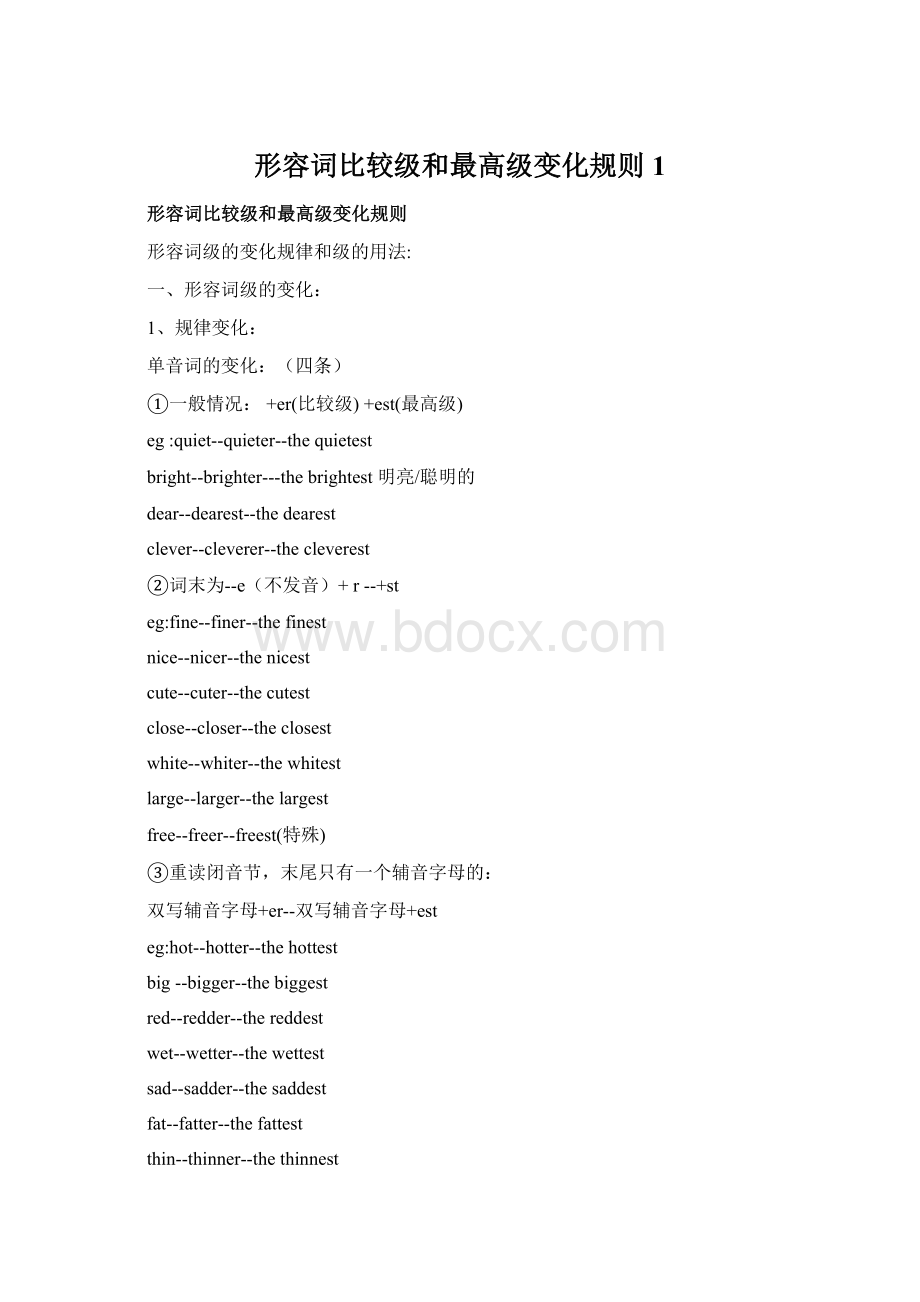形容词比较级和最高级变化规则1.docx
《形容词比较级和最高级变化规则1.docx》由会员分享,可在线阅读,更多相关《形容词比较级和最高级变化规则1.docx(10页珍藏版)》请在冰豆网上搜索。

形容词比较级和最高级变化规则1
形容词比较级和最高级变化规则
形容词级的变化规律和级的用法:
一、形容词级的变化:
1、规律变化:
单音词的变化:
(四条)
①一般情况:
+er(比较级)+est(最高级)
eg:
quiet--quieter--thequietest
bright--brighter---thebrightest明亮/聪明的
dear--dearest--thedearest
clever--cleverer--thecleverest
②词末为--e(不发音)+r--+st
eg:
fine--finer--thefinest
nice--nicer--thenicest
cute--cuter--thecutest
close--closer--theclosest
white--whiter--thewhitest
large--larger--thelargest
free--freer--freest(特殊)
③重读闭音节,末尾只有一个辅音字母的:
双写辅音字母+er--双写辅音字母+est
eg:
hot--hotter--thehottest
big--bigger--thebiggest
red--redder--thereddest
wet--wetter--thewettest
sad--sadder--thesaddest
fat--fatter--thefattest
thin--thinner--thethinnest
fit--fitter--fittest
④少数以辅音字母+y结尾的双音节原根词:
变y为i+er变y为i+est
形容词和副词用法比较
形容词和副词形容词和副词在语法结构中主要用于比较级和最高级。
形容词和副词的构成形式基本上一样,它们的形式与单音节、双音节和多音节有关,当然还有其特殊形式。
形容词和副词比较级的基本用法分为同级比较、比较级和最高级三种形式。
但这三种形式都有它们特殊的表达方式以及它们的惯用法。
对以下要点大家须一一掌握。
第一节形容词比较级和最高级的形式
一、形容词比较级和最高级的构成
形容词的比较级和最高级变化形式规则如下
构成法原级比较级最高级
①一般单音节词末尾加er和eststrongstrongerstrongest
②单音节词如果以e结尾,只加r和ststrangestrangerstrangest
③闭音节单音节词如末尾只有一个辅音字母,
须先双写这个辅音字母,再加er和estsad
big
hotsadder
bigger
hottersaddest
biggest
hottest
④少数以y,er(或ure),ow,ble结尾的双音节词,
末尾加er和est(以y结尾的词,如y前是辅音字母,
把y变成i,再加er和est,以e结尾的词仍
只加r和st)angry
clever
narrow
nobleangrier
cleverer
narrower
noblerangrest
cleverest
narrowest
noblest
⑤其他双音节和多音节词都在前面加单词more和mostdifferentmore
differentmost
different
1)Themosthigh〔A〕mountainin〔B〕theworldisMountEverest,whichissituated〔C〕inNepalandis
twentyninethousandonehundredandfourtyonefeethigh〔D〕.
2)Thishouseisspaciouser〔A〕thanthat〔B〕white〔C〕oneIboughtinRapidCity,SouthDakota〔D〕lastyear.
3)Researchinthesocial〔A〕sciencesoftenprovesdifficulter〔B〕thansimilar〔C〕workinthephysical〔D〕sciences.
二、形容词比较级或最高级的特殊形式:
1.三个或三个以上音节的形容词只能加more和most
只能说morebeautiful而不能说beautifuller;只能说themostbeautiful而不能说beautifullest。
但是,以形容前缀un结尾的三音节形容词不适合上述情况,如unhappy,untidy,我们可以说:
unhappier→unhappiest,untidier→untidiest
2.由ING分词和ED分词演变过来的形容词(包括不规则动词如know→known)只能加more或most来表示它们的比较级和最高级
more(most)striking,more(most)interesting,more(most)wounded,more(most)worn等。
4)Thedrawings〔A〕oftheoldmasters〔B〕areamongthetreasuredest〔C〕worksinmuseums〔D〕.
3.英语里有些形容词由于其词义而不可能有比较级形式
absolutefatalmainrightuniversal
chieffinalnakedsimulta-utter
entireforemostperfectneousvital
eternalinevitablepossiblesufficientwhole
excellentinfiniteprimarysupremewooden
三、不规则形容词的比较级和最高级形式
good
wellbetterbest
bad
illworseworst
many
muchmoremost
little
fewlessleast
farfartherfarthest
furtherfurthest
5)Africanelephantsarelarger,fiercer,anddifficulter〔A〕totame〔B〕than〔C〕Asianelephants〔D〕.
6)SarahHalebecame〔A〕oneofthefamousest〔B〕magazine〔C〕editorsintheUnitedStatesduring〔D〕the1800’s.
7)Ofall〔A〕theNativeAmericantribes〔B〕,theShawneeIndianswere〔C〕amost〔D〕transient.
四、例题解析
1)A错。
应将“mosthigh”改为highest。
这是在考形容词比较级的构成形式。
2)A错。
改为morespacious。
3)B错。
改为moredifficult。
4)C错。
treasured在本句中是ED分词(动词treasure+ed)作形容词使用,是“宝贵的、珍贵的”意思,修饰名词works(作品),其最高级形式应用themosttreasured。
5)A错,改为moredifficult。
6)B错。
改为“themostfamous”,因为famous(著名的)是双音节,其最高级变化应在前面加“themost”。
7)D错。
应改为“themost”,因为此处表示的是最高级,“themosttransient”意为“(延续时间)最短暂的”。
第二节副词比较级和最高级的形式
副词比较级和最高级的变化形式与形容词基本上一样
一般副词
hard→harder→hardest
fast→faster→fastest
late→later→latest
early→earlier→earliest
特殊副词
well→better→best
much→more→most
badly→worse→worst
little→less→least但是,开放类副词即以后缀ly结尾的副词不能像形容词那样加er或est,如
quickly→morequickly→mostquicklyquietly→morequietly→mostquietly
〔注〕:
early中的ly不是后缀,故可以把y变i再加er和est
第三节形容词与副词比较级和最高级的基本用法
一、原级比较的基本用法
1.原级比较由“as+形容词或副词(或再加名词或短语)+as”构成“原级相同”比较句,表示两者比较;其否定式,即“程度不及”比较句型为“notso(as)+形容词或副词+as”,而且as…as结构前可用just,almost,nearly,quite等表示程度的词修饰
1)Walkingbrisklyforthirtyminuteswillburnasmanycaloriesas.
〔A〕torunforfifteenminutes
〔B〕runningforfifteenminutes
〔C〕yourunforfifteenminutes
〔D〕fifteenminutewalking
2)Thegorilla(大猩猩),while〔A〕notquiteascuriousthan〔B〕thechimpanzee(黑猩猩),showsmorepersistence〔C〕andmemoryretention(记忆力)insolving〔D〕aproblem.
3)Alaskaistwice〔A〕aslarger〔B〕as〔C〕thenextlargest〔D〕state,Texas.
2.“as(so)+名词+as+名词”进行名词比较,这时一般情况下有一个表示原级的比较词,但如果第一名词前出现了形容词修饰该词或出现副词修饰谓语,应当用so而不用as
4)ThomasJefferson’sachievementsasanarchitectrivalhiscontributionsapolitician.
〔A〕such
〔B〕more
〔C〕as
〔D〕than
5)IshouldsayHenryisnotmuchawriterasareporter.(88年考题)
〔A〕that
〔B〕so
〔C〕this
〔D〕as
二、比较级
1.比较级由“形容词(副词)比较级+than+…,”构成表示在两者中间一方比另一方“更加…”。
连词than后可接句子,也可接名词、代词、名词短语、介词短语、动词、动词不定式、ING结构和ED结构,有时也可省去than。
6)Naturalmica(云母)of〔A〕asuperior〔B〕qualityischeapest〔C〕toobtainthansynthetic〔D〕mica.
7)Sheisolderthan.
〔A〕anyothergirlinthegroup
〔B〕anygirlinthegroup
〔C〕allgirlsinthegroup
〔D〕youandmeaswellasthegroup
8)JosephineMcCrackinjoined〔A〕the“SantaCruzSentinel”in1905and,untilherdeathfifteenyearslate〔B〕,remained〔C〕activeinjournalistic〔D〕work.
2.注意than前后两项相比较的人或事物要一致
9)Thepurposeoftheresearchhadamoreimportantmeaningforthemthan.
〔A〕ours
〔B〕withus
〔C〕foroursithad
〔D〕itdidforus
10)Soundtravelsair.
〔A〕fasterthroughwaterthanthrough〔B〕fasterthanthroughwaterand
〔C〕throughwaterfasterand〔D〕whereitisfasterthroughwaterthanthrough
11)GerbrandvondenFeckhout,oneofRembrand’spupils,followed〔A〕thestyleofhisteachersoimplicitlythat〔B〕hispaintings〔C〕aresometimesconfusedwithhismaster〔D〕.
三、最高级
1.最高级用于三者以上比较,形容词的结构形式是“定冠词+形容词最高级+名词+表示范围的短语或从句”(如all,ofall,ofthetree,intheworld,thathasevertakenplace等)
12)Themore〔A〕fearsomeofallthe〔B〕animalsin〔C〕theWestern〔D〕Hemisphereisthegrizzlybear.
13)Ofalleconomic〔A〕problems,inflationcontinuestobe〔B〕a〔C〕mostsignificantinitsdailyimpacton〔D〕peopleandbusiness.
14),themostfamiliartogeneralpublicisthecriminaljurisdiction.
〔A〕Alltheactivities
〔B〕Theactivities
〔C〕Ofalltheactivities
〔D〕Itistheactivities
2.副词的最高级与形容词最高级的区别在于最高级前没有定冠词the
四、例题解析
1)B为正确答案。
2)B错。
改为as,和前面的as和形容词原形curious一起构成同程度比较。
3)B错。
改为aslarge。
4)C对。
动词rival(胜过、匹敌)前后是两个相比较的成分achievements(成果)和contributions(贡献),由于前面的名词后出现了短语asanarchitect,故空白处也应用as,使前后对比成分一致。
5)B为正确答案。
6)C错。
应改为比较级cheaper。
比较级后并不一定跟接连词than,有时在其间有名词或名词短语(被形容词所修饰),介词短语,不定式或其他成分隔开。
7)A为正确答案。
“She”作为单个不能跟全组比(C和D不对),也不能跟全组所有相比,因为“她”也是其中一员,自然“她”不能跟自己相比。
这里“She”比较的是“这组中的任何一个”,所以A对。
8)B错。
应改为比较级later,因此处实为与1905年相比晚15年,故应使用比较级。
9)D为正确答案。
10)A为正确答案。
11)D错。
改为hismaster’s。
12)A错。
改为most。
13)C错。
改为the,significant是多音节形容词,在此处应用最高级形式(在前面加themost),注意句中的“ofall…”。
14)C为正确答案。
本句空白处缺状语,A和B全为名词短语,不符合条件;D为句子,和空白后面的句子没有任何联系,故亦应排除。
只有C正确,和后面的最高级themostfamiliar前后呼应。
第四节形容词和副词的特殊表达法
一、形容词与副词的同级比较:
由“as(so)…as”引出,其否定式为“notso…”或“notas…as”,考生还应注意下列含有“as”结构或短语的句子
1.assuch:
表示上文所指明的事或人
Heisachild,andmustbetreatedassuch.他是个孩子,必须被当作孩子对待。
2.asmuch:
表示“与…同量”
Takeasmuchasyoulike.拿多少都行。
Iwouldgladlyhavepaidtwiceasmuchforit.就是价格再贵一倍,我也会愿意把它买下的。
Heasmuchasadmittedthewholestory.他几乎全部承认了。
3.asmany:
表示“与…一样多”
Ifoundsixmistakesinasmanylines.我在六行中发现了六个错。
二、表示“几倍于”的比较级:
用twice(两倍),fourtimes(四倍),tentimes(十倍)加上as…as结构
Thisoneisfourtimesasbigasthatone.这个是那个的四倍大。
(这个比那个大三倍。
)/Ourcampusisthreetimesaslargeasyours.我们的校园比你们的大两倍。
/Hehasbookstwiceasmanyasshedoes.他的书比她多一倍。
1)Thefiveyeardealobligates〔A〕thecountrytobuyninemilliontons〔B〕ofgrainayear〔C〕,threemillionmoreas〔D〕theoldpact’sminimum.
三、“thesame+名词+as”表示同等比较
2)Thelensofacameraperformsthelensoftheeye.
〔A〕inthesamefunction〔B〕thesamefunctionas
〔C〕thefunctionisthesameas〔D〕andhasthesamefunction
3)Theeliminationofinflationwouldensurethattheamountofmoneyusedinrepayingaloanwould
haveastheamountofmoneyborrowed.
〔A〕asthesamevalue〔B〕thesamevalue
〔C〕valueasthesame〔D〕thevalueisthesame
四、比较级前可用alittle,abit,slightly,agreatdeal,alot,many,much等词语表示不定量,far,completely,still表示程度或更进一步
4)Therearenowmethodsforstudyingcolorvisionininfantsthanthereoncewere.
〔A〕moresophisticatedthan
〔B〕muchmoresophisticated
〔C〕muchsophisticated
〔D〕sophisticated
5)ThephotographsofMarstakenbysatellitearethanthosetakenfromtheEarth.
〔A〕clearest
〔B〕theclearest
〔C〕muchclearer
〔D〕moreclearer
6)Commonporpoises(海豚)areusuallynotconsidered〔A〕migratory,although〔B〕somedomove〔C〕tomorewarmer〔D〕watersinwinter.
兼有两种形式的副词
1)close与closely
close意思是"近";closely意思是"仔细地"
Heissittingclosetome.
Watchhimclosely.
2)late与lately
late意思是"晚";lately意思是"最近"
Youhavecometoolate.
Whathaveyoubeendoinglately?
3)deep与deeply
deep意思是"深",表示空间深度;deeply时常表示感情上的深度,"深深地"
Hepushedthestickdeepintothemud.
Evenfatherwasdeeplymovedbythefilm.
4)high与highly
high表示空间高度;highly表示程度,相当于much
Theplanewasflyinghigh.
Ithinkhighlyofyouropinion.
5)wide与widely
wide表示空间宽度;widely意思是"广泛地","在许多地方"
Heopenedthedoorwide.
Englishiswidelyusedintheworld.
6)free与freely
free的意思是"免费";freely的意思是"无限制地"
Youcaneatfreeinmyrestaurantwheneveryoulike.
Youmayspeakfreely;saywhatyoulike.
形容词使用顺序巧记忆
当两个以上形容词修饰一个名词,形容词该如何排列?
为什么不能说ablacknewpen,而要说成anewblackpen?
这里面有无规则可循?
如果你记住Opshacom这个为帮助记忆而杜撰的词,就能掌握英语中形容词排列的顺序。
Op